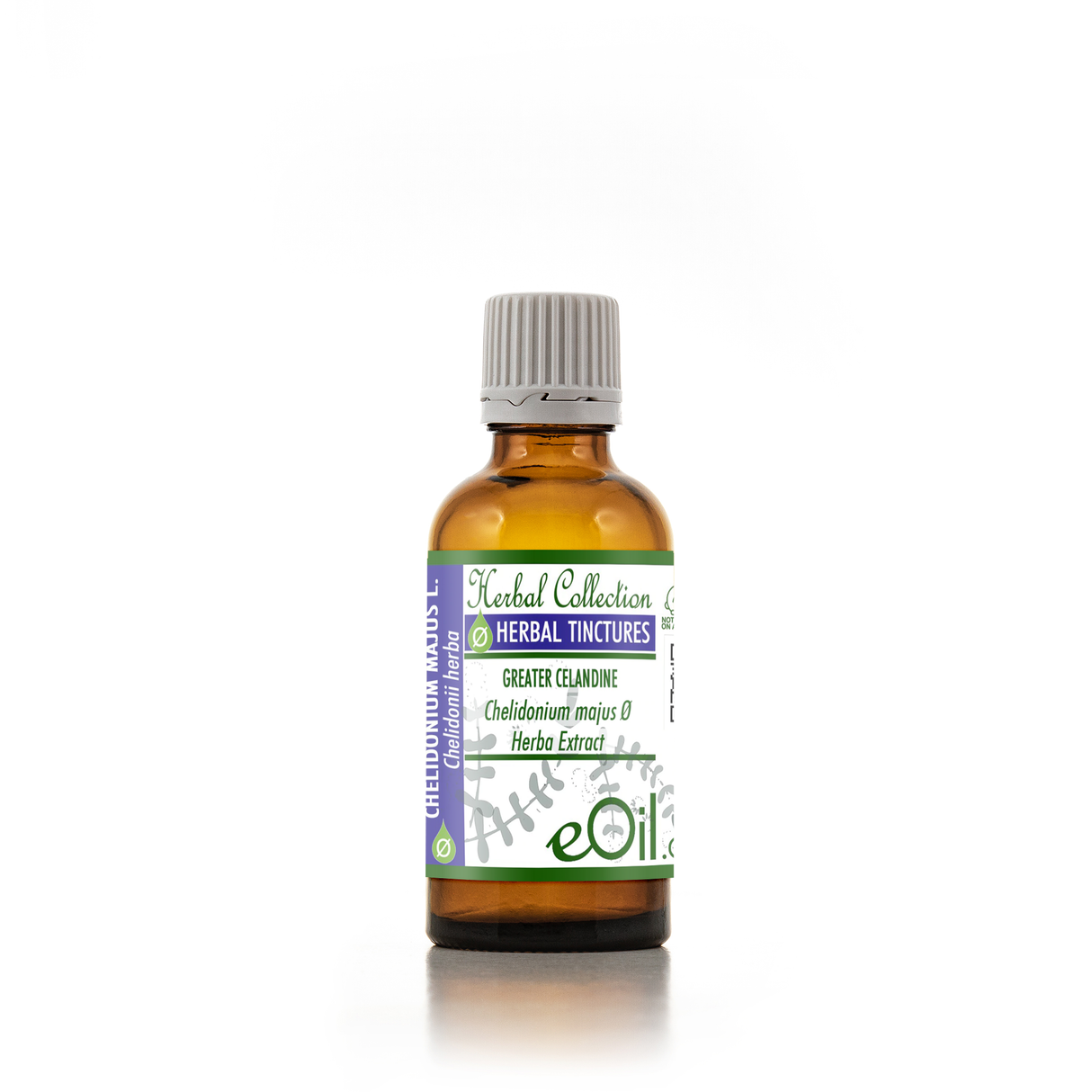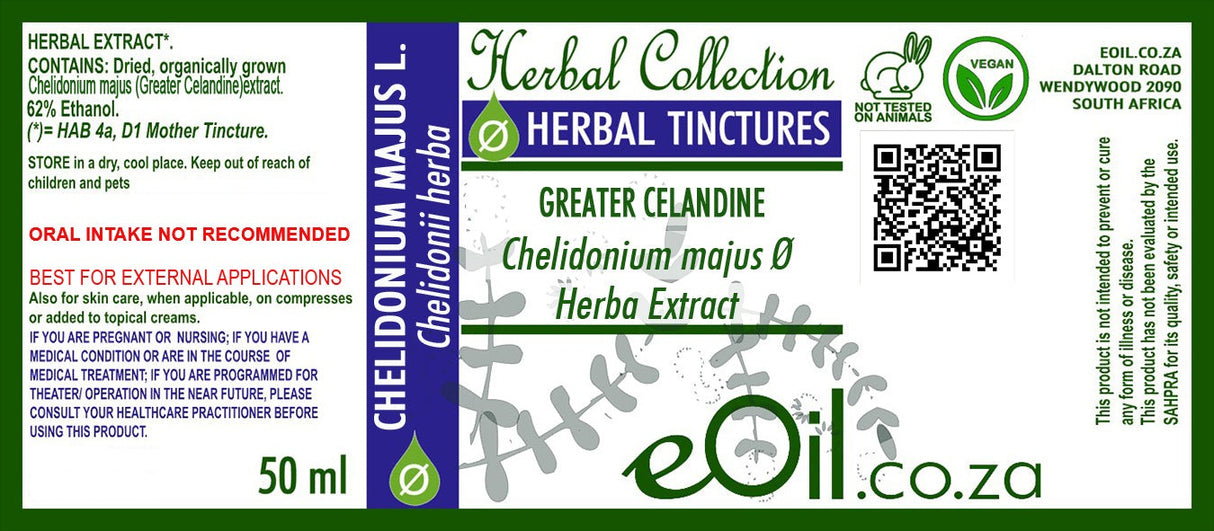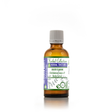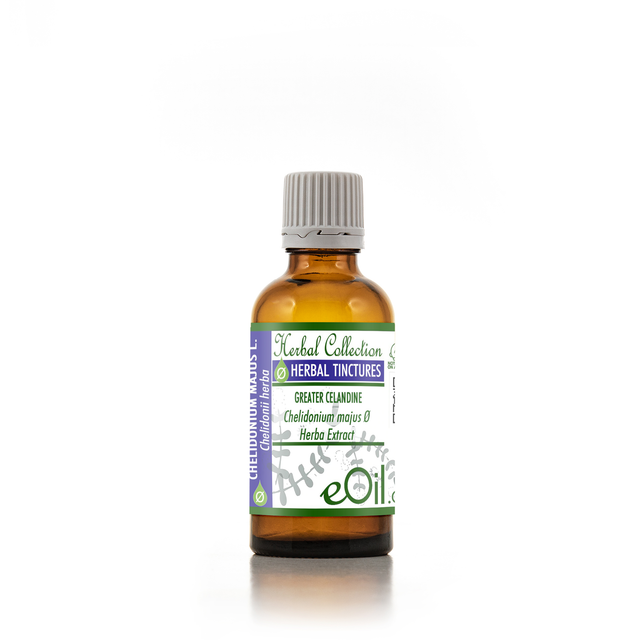Greater celandine - Liquid Herbal Extract
Greater celandine - Liquid Herbal Extract - 50 ML is backordered and will ship as soon as it is back in stock.
Description
Description
Understanding Mother Tinctures & Glycerines
Greater celandine (Chelidonium majus) Liquid Herbal Extract Tincture
Greater celandine (Chelidonium majus) Liquid Herbal Extract Tincture is a traditional botanical remedy prized for supporting digestive and liver health. This extract is known for stimulating bile production, easing liver stagnation, and assisting the body’s natural detoxification processes. Used by herbalists for challenges such as indigestion, bloating, flatulence, and abdominal discomfort, greater celandine’s bitter compounds promote healthy digestion and gallbladder function while helping to relieve occasional constipation.
In addition to its digestive benefits, greater celandine tincture offers anti-inflammatory and antimicrobial properties, making it useful as a topical application for warts and certain skin conditions. Its unique blend of alkaloids, flavonoids, and phenolic acids contributes to its reputation for holistic wellness support. For safety, this herb should always be used under the guidance of a qualified practitioner, as recommended by herbal regulatory authorities, with special caution taken for pregnant, breastfeeding individuals or those with serious liver or gallbladder conditions
TRADITIONALLY USED FOR
ORAL INTAKE NOT RECOMMENDED | BEST FOR EXTERNAL APPLICATIONS !
Forbidden for pregnant women & children
Greater Celandine Herbal Liquid Extract (Tincture): An Overview for Wellness Websites
Greater celandine, scientifically known as Chelidonium majus, is a plant with a long history of use in traditional medicine. The herbal liquid extract, or tincture, derived from this plant is used for various health purposes. Here is a comprehensive overview of its properties, uses, and safety considerations for your aromatherapy and wellness website.
Botanical and Extraction Details
- Botanical Name: Chelidonium majus
- Family: Papaveraceae
- Extraction Method: Alcohol extraction (tincture)
- Plant Part Used: Above-ground parts, roots, and rhizomes
- Origin: Native to Europe and Asia, introduced in North America.
INCI and CAS Information
- INCI Name: Chelidonium majus extract
- CAS Number: 84603-56-5
- EC Number: 283-257-3.
Appearance and Aroma
- Color: Typically a dark brown liquid
- Aroma: Earthy and herbal.
Therapeutic Properties
Greater celandine extract is known for several therapeutic properties, including:
- Antispasmodic: Relieves spasms in the digestive tract.
- Choleretic: Stimulates bile production and flow, aiding digestion.
- Detoxifying: Traditionally used for liver and gallbladder detoxification.
- Anti-inflammatory: Reduces inflammation.
- Antimicrobial: Exhibits antimicrobial properties.
Chemical Components
The main chemical constituents of greater celandine include:
- Alkaloids: Chelidonine, chelerythrine, sanguinarine, berberine, and coptisine.
Uses in Traditional Medicine
- Digestive Health: Used to alleviate indigestion, stomach cramps, and irritable bowel syndrome (IBS).
- Liver and Gallbladder Support: Traditionally used to support liver function and treat gallbladder disorders.
- Topical Applications: Applied to the skin for warts, eczema, and other skin conditions.
Safety and Precautions
- Liver Toxicity: Greater celandine has been associated with liver toxicity, and its use should be approached with caution. It is considered possibly unsafe when taken orally due to potential liver damage.
- Pregnancy and Nursing: Not recommended for use during pregnancy or while breastfeeding.
- Children: Should be avoided in children under age 12.
- Potential Side Effects: May cause stomach upset, skin rash, or allergic reactions. Use under the guidance of a healthcare professional.
Dosage and Administration
- Typical Dosage: A common dosage for tinctures is 1–3 ml mixed in water, taken 10–30 minutes before meals. However, dosage should be personalized and supervised by a healthcare provider. Oral intake not recommended if not supervised
- Topical Use: Fresh latex or concentrated tinctures can be applied directly to warts.
Conclusion
Greater celandine herbal liquid extract is a potent herbal remedy with a variety of traditional uses, particularly for digestive and liver health. However, due to its potential for liver toxicity, it should be used cautiously and under professional supervision. It is essential to consult a healthcare provider before using this extract, especially for individuals with liver conditions or those taking other medications.
INFORMATION
Source : http://www.wikiphyto.org/wiki/Greater Celandine
Reference on http://www.wikiphyto.org
Translation in English by Google Translate (go to the page of the source linked | on Chrome cellphones go on the 3 dots on the top right and select translate in your preferred language | on laptop right click your mouse and select option translate when hoovering on the page
plant name
Celandine, wart grass , lightning , great lightning
International Latin denomination
botanical family
Papaveraceae
Description and habitat
- Very common perennial plant in walls, rubble, ditches
- Thick stump, soft leaves, glaucous green below, deeply cut, flowers with 4 yellow petals, bumpy glabrous seedpods
History and tradition
- Breaking the plant causes a caustic orange latex to flow
- It was formerly used to improve eyesight, in case of cataracts
- According to Pliny and Dioscorides, swallows fed on the latex to increase their visual acuity
Parts used
- Whole plant, latex, root
Dosage forms available
- Whole plant tincture
Usual dosages
Composition
Main components of the plant
- Alkaloids , up to 2%:
- Benzophenanthridines : chelidonine , chelerythrine , sanguinarine (especially in the underground parts)
- Protopines
- Protoberberines : berberine , coptisine , stylopine
- Flavonoids :
- Phenolic acids :
- Hydroxycinnamic acids ( caffeic acid , p-coumaric acid , ferulic acid )
- Proteins:
- Others :
- Organic acids: chelidonic acid , malic acid , citric acid , succinic acid , (Kopytko et al., 2005)
- Amines biogéniques : histamine, méthyloamine, tyramine
- Triterpénoïdes
- Saponins , resin, vitamins A, C
- The flowers contain xanthophyll pigments ( lutein , violaxanthin , flavoxanthin , chrysanthemoxanthin
Main components of buds or young shoots
Main components of essential oil
Properties
Plant properties
- The extract is antibacterial and antiviral [1] , antiretroviral activity of certain substances (poly-glycosaminoglycan) [2]
- Benzophenanthridines are cytotoxic
- Antispasmodic bronchial, gallbladder and intestines
- Analgesic
- Contract the uterus
Bud properties
Properties of essential oil
Indications
Indications of the whole plant (phytotherapy)
- Warts externally (the juice directly in local applications)
- Toxic, use only in dilutions:
- Bronchitis, whooping cough and asthma
- Cholelithiasis and jaundice
Indications of the bud (gemmotherapy)
Specific indications of essential oil (aromatherapy)
Known or suspected mode of action
Usual formulations
Regulations
- French Pharmacopoeia list A (aerial part)
Possible side effects and precautions for use
- Forbidden to pregnant women, children
- Toxic, use only in dilutions, hepatotoxic [3] , [4] , [5]
- Causes drowsiness, bradycardia, paralysis of sensory nerve endings, alkaloids are cytotoxic and antiviral
Bibliographic references
- Go↑ Kéry A, Horváth J, Nász I, Verzár-Petri G, Kulcsár G, Danish P. Antiviral alkaloid in Chelidonium majus L. Acta Pharm Hung. 1987 Mar; 57 (1-2): 19-25. PMID 3035867
- Go↑ Gerencer M, Turecek PL, Kistner O, Mitterer A, Savidis-Dacho H, Barrett NP. In vitro and in vivo anti-retroviral activity of the substance purified from the aqueous extract of Chelidonium majus L. Antiviral Res. 2006 Nov;72(2):153-6. PMID 16647765
- Go↑ Stickel F, Pöschl G, Seitz HK, Waldherr R, Hahn EG, Schuppan D. Acute hepatitis induced by Greater Celandine (Chelidonium majus). Scand J Gastroenterol. 2003 May;38(5):565-8. PMID 12795472
- Go↑ Moro PA, Cassetti F, Giugliano G, Falce MT, Mazzanti G, Menniti-Ippolito F, Raschetti R, Santuccio C. Hepatitis from Greater celandine (Chelidonium majus L.): review of literature and report of a new case. J Ethnopharmacol. 2009 Jul 15; 124 (2): 328-32. PMID 19397968
- Go↑ Teschke R, Frenzel C, Glass X, Schulze J, Eickhoff A. Greater Celandine hepatotoxicity: a clinical review. Ann Hepatol. 2012 Nov-Dec;11(6):838-48. PMID 23109446
- Zielińska, S., Jezierska-Domaradzka, A., Wójciak-Kosior, M., Sowa, I., Junka, A., & Matkowski, A. M. (2018). Greater Celandine's Ups and Downs-21 Centuries of Medicinal Uses of Chelidonium majus From the Viewpoint of Today's Pharmacology. Frontiers in pharmacology, 9, 299. https://doi.org/10.3389/fphar.2018.00299. PMID 29713277
CAUTION
Store in a cool, dry place, away from light. Keep tightly closed, away from the reach of Children and pets.
Do not exceed the daily dose.
This product is not intended to prevent or cure any form of illness or disease.
If you are pregnant or nursing ; If you have a medical condition or are in the course of medical treatment ; If you are programmed for theater/operation in the near future, please consult your healthcare practitioner before using this product.
This product cannot replace a varied and balanced diet and a healthy lifestyle.
This product has not been evaluated by the SAHPRA for its quality, safety or intended use.
For More Information please check our General Safety Herbal products Page





